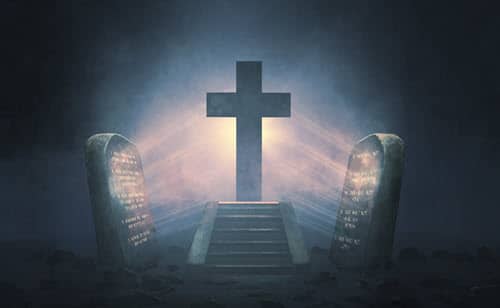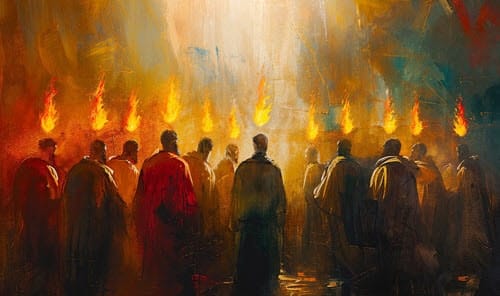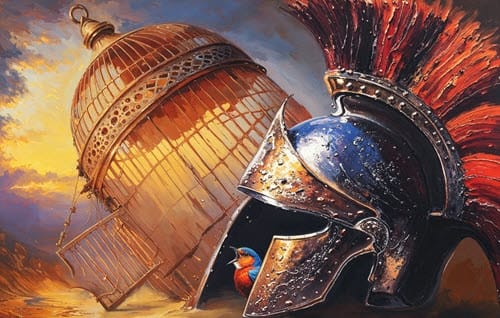Should Christians Worship on Saturday or Sunday?
Prologue
John 4:22-24 “You worship what you do not know; we worship what we know, for salvation is from the Jews. “But an hour is coming, and now is, when the true worshipers will worship the Father in spirit and truth; for such people the Father seeks to be His worshipers. “God is spirit, and those who worship Him MUST worship in spirit and truth.”
Introduction
Does it matter what day Christians assemble to worship as a body of believers? On the surface, it seems that it doesn’t matter. I never gave it much thought until John 4:22—“You worship what you do not know; we worship what we know”—caught my attention. I believe that every faithful Christian desires to worship in a manner that pleases God. Therefore, let us allow Scripture to guide us and reveal the truth. Let’s begin.
Table of Contents
This essay will present 10 positions, plus a Conclusion, arranged in a progressive order, to address the question of what day Christians should gather to worship.
- The Fourth Commandment
- Jews and Gentiles are of one body
- Verses for Sunday Service Reasoning
- Day of Pentecost
- Roman Emperor Constantine
- Colossians 2:16-17
- The Roman Catholic Church
- Traditions
- Lord of the Sabbath
- Matthew 22:37 and Galatians 5:14
- Conclusion
1. The Fourth Commandment

Exodus 20:8-11 “Remember the sabbath day, to keep it holy. “Six days you shall labor and do all your work, but the seventh day is a sabbath of the LORD your God; in it you shall not do any work, you or your son or your daughter, your male or your female servant or your cattle or your sojourner who stays with you. “For in six days the LORD made the heavens and the earth, the sea and all that is in them, and rested on the seventh day; therefore, the LORD blessed the sabbath day and made it holy.”
Summary: Are Christians subject to the fourth commandment? Does it matter what day of the week Christians worship? Using systematic Theology as a guide, let us find out.
2. Jews and Gentiles are of One Body

Exodus 31:12-18 The LORD spoke to Moses, saying, “But as for you, speak to the sons of Israel, saying, ‘You shall surely observe My sabbaths; for this is a sign between Me and you throughout your generations, that you may know that I am the LORD who sanctifies you. ‘Therefore you are to observe the sabbath, for it is holy to you. Everyone who profanes it shall surely be put to death; for whoever does any work on it, that person shall be cut off from among his people. ‘For six days work may be done, but on the seventh day there is a sabbath of complete rest, holy to the LORD; whoever does any work on the sabbath day shall surely be put to death. ‘So the sons of Israel shall observe the sabbath, to celebrate the sabbath throughout their generations as a perpetual covenant.’ “It is a sign between Me and the sons of Israel forever; for in six days the LORD made heaven and earth, but on the seventh day He ceased from labor, and was refreshed.” When He had finished speaking with him upon Mount Sinai, He gave Moses the two tablets of the testimony, tablets of stone, written by the finger of God.
Ephesians 3:5-6 “which in other generations was not made known to the sons of men, as it has now been revealed to His holy apostles and prophets in the Spirit; to be specific, that the Gentiles are fellow heirs and fellow members of the body, and fellow partakers of the promise in Christ Jesus through the gospel,”
Summary: In Exodus 31:16, Moses states that the sabbath is more than the fourth commandment, “but a never-ending or changing perpetual covenant.” In Ephesians 3:5-6, Paul states that both Jew and Gentile are of one body. This would then lead to the conclusion that present-day Christians are subject to the Sabbath. But wait, what about Colossians 2:16, Acts 20:7, and 1 Corinthians 16:1-2?
3. Verses For Sunday Service Reasoning

Colossians
Colossians 2:16: ” So let no one make rules about what you eat or drink or about holy days or the New Moon Festival or the Sabbath. “
Summary: This was Paul’s second warning regarding legalism. Those in Colossae believed that the path to spiritual growth was to observe the Sabbath and festivals, and to abstain from certain foods and drinks. However, as we know, sanctification comes from surrender, not false compliance.
Acts
KJV = Act 20:7: “And upon the first day of the week, when the disciples came together to break bread, Paul preached unto them, ready to depart on the morrow; and continued his speech until midnight.”
NASB = Act 20:7 “On the first day of the week, when we were gathered together to break bread, Paul began talking to them, intending to leave the next day, and he prolonged his message until midnight.”
GNB = Act 20:7 “On Saturday evening we gathered together for the fellowship meal. Paul spoke to the people and kept on speaking until midnight, since he was going to leave the next day.”
Summary: If Luke followed Roman reckoning, which seems to have been the case, days were reckoned from midnight to midnight, as is our procedure. It would thus have been Sunday night, and Paul’s projected departure was scheduled for Monday morning. At Troas, we are given a glimpse into the main elements of an early Christian worship service. It was observed on the first day of the week and consisted of the breaking of bread (the Lord’s Supper) and teachings.
1 Corinthians
KJV = 1Co 16:1-2 “Now concerning the collection for the saints, as I have given order to the churches of Galatia, even so do ye. Upon the first day of the week let every one of you lay by him in store, as God hath prospered him, that there be no gatherings when I come.”
NASB = 1Co 16:1-2 “Now concerning the collection for the saints, as I directed the churches of Galatia, so do you also. On the first day of every week each one of you is to put aside and save, as he may prosper, so that no collections be made when I come.”
Summary: Sometimes, one fails to realize that in Acts 22:3, Paul provides us with insight into his remarkable background. Paul, before his conversion, Acts 9:1-9 was Saul, a student of Gamaliel. Saul received extensive training in both OT law and rabbinic traditions. Saul, now Paul, after conversion, was taught that Jews were forbidden from handling money on the Sabbath; therefore, the arrangement to set aside money on the first day of the week was a convenience to avoid offense. Note, that there was no mention of a worship service in this instance.
Understanding
As mentioned in Romans 16:3-5, 1 Corinthians 16:19, Colossians 4:15, and Philemon 1:1-2, the founding, early churches initially met in individual homes due to social and political challenges. These home churches laid the foundation of the contemporary church of today. However, should these founding churches have become legacy churches, adopting some of their traditions, as we experience today with the understandings listed below
- Early home church services were typically held on Sunday, as many new Jewish converts to Christianity attended synagogue on the Sabbath.
- To avoid social unrest and persecution from Jewish, Roman authorities, Pagan Priests, and Idol-Makers, some of the early churches met on Sunday, some in secret,
4. Day of Pentecost

Numerous Theologians, Pastors, and Ministers believe that Pentecost is solely a Christian event that ushered in the church on the first day of the week, Sunday. Thus, reasoning for Sunday as the day of worship. However, to Messianic Jewish believers and some Christians, Pentecost is part of a celebration known as Shavuot, which is the Hebrew word meaning “weeks.” Shavuot marked the end of the barley harvest and the beginning of the wheat harvest in the Land of Israel, as stated in Exodus 34:22 of the Hebrew Bible.
This is one of three separate names that are used in Scripture to refer to this critical Jewish feast. Besides being referred to as the “Feast of Weeks” in Leviticus 23, this special feast celebration is also known as the “Day of the Firstfruits” in Numbers 28:26, and the “Feast of Harvest” in Exodus 23:16. The Feast of Weeks takes place 50 days after the Feast of Firstfruits. It typically occurs in late spring, usually around the last week of May or the first week of June.
Unlike other feasts that begin on a specific day of the Hebrew calendar, this one is calculated as 7 weeks (49 days) plus 1 day after the Feast of First Fruits, which is the day the sheaf of the wave offering is presented (Leviticus 23:15-16; Deuteronomy 16:9-10). .
The Feast of Weeks is significant in that it foreshadows the coming Messiah. Jesus was crucified as the “Passover Lamb” and rose from the grave at the Feast of Firstfruits. Following His resurrection, Jesus spent the next 40 days teaching His disciples before ascending to heaven (Acts 1).
Fifty days after His resurrection and ascension to heaven to sit at the right hand of God, Jesus sent the Holy Spirit, as promised (John 14:16-17), to empower the disciples for their ministry. The promised Holy Spirit arrived on the day most Christians call the “Day of Pentecost”, which is another name for the Feast of Weeks (Shavuot). Note: PENTECOST pen´ti-kost [πεντηκοστή pentēcostē]. Meaning “fiftieth (day),” a Greek name for the Festival of Weeks described in the holiday lists in Exodus 23:14-17; 34:18, 22–24; Leviticus 23; Numbers 28–29; and Deuteronomy 16.
Summary; When Jesus instructed His followers to wait for the Holy Spirit, He was observing the Jewish festival of Shavuot. But instead of harvesting grain, the disciples would start harvesting souls. Note: the Parable of the Sower found in Matthew 13:1-23, Mark 4:1–20, and Luke 8:4–15. But what led to Contemporary Christians’ departure from the Sabbath, Passover, Pentecost, and other observances, and the creation of their own customs, traditions, and holidays?
*** Special Thanks to Larry Hawkes for his assistance in this position. Truth and clarity are foremost, and Larry’s assistance added to that measure.
5. Roman Emperor Constantine

The Decision at the Council of Nicaea
What many Christians have failed to realize or have been taught is that both early Christians and Jews celebrated Passover together until Roman Emperor Constantine, a member of the Council of Nicaea, convened “The Council of Nicaea in 325 A.D.” to separate, thus making a significant turning point in the history of both celebrations. The debate centered on whether the resurrection of Yeshua should be observed on the 14th of Nisan, as it is celebrated during Passover. However, the practice of commemorating the death of Christ on the day of Passover was ultimately deemed unacceptable by Constantine since it required dependence on Jewish traditions. Constantine’s decision explicitly rejected Jewish influence and severed ties to anything Jewish in determining the celebration of Passover. This led to a historical split; thus, according to one’s denomination, new Christian Holidays were founded and called Easter, Holy Week, or Passion Week. As a result, the new Christian holy days became more similar to pagan holidays due to the unfortunate tradition of resembling the pagan celebrations of goddesses Astarte and Ostara, which were replete with fertility, bunnies, and eggs. This decision also marked another instance of non-adherence to the Ten Commandments, specifically the prohibition against worshiping any other God. Even though the council decided to separate only Passover, the foundation was set to separate ‘all’ holy days as witnessed in contemporary church worship.
Summary: Roman Emperor Constantine’s actions stemmed from human desire, and wisdom rather than divine inspiration and compliance to God’s Holy Word for Romans 3:31, John 14:21, and 1 John 2:4 state that all Christians are to adhere to the law, specifically the Ten Commandments, for if not, “the Truth” and “the Righteousness of God” have not been manifested in the individual. Hold on! Colossians 2:16-17 states that Christians do not have to observe or respect festivals, new moons, or Sabbath days. On the surface, it appears to state just that, but have you been taught the whole truth about these Holy Bible passages? Let’s See!
6. Colossians 2:16-17

Col 2:16 “Therefore no one is to act as your judge in regard to food or drink or in respect to a festival or a new moon or a Sabbath day— “
Col 2:17 “things which are a mere shadow of what is to come; but the substance belongs to Christ.”
Summary: Three points need to be addressed. The first is that Paul is condemning the Gnostics, who taught that salvation could be gained through secret knowledge, or mythical special revelation by Jesus Christ. The second being that the new Jewish converts’ philosophy of Christ Jesus was not fully understood, as they had not grasped the fullness of the revelations of Christ Jesus. Finally, as stated in position #3, Paul is trying to convey that sanctification comes from surrender, not false compliance. Paul never says not to honor the Sabbath, but instead not to submit to those who make “deceptive philosophy, Col 2:8.”
But, if all this is ‘Truth“, then why did the church continue worship on Sunday rather than Saturday? Good Question, Let’s now look at the Roman Catholic Church..
7. Roman Catholic Church

According to traditional teachings, the Roman Catholic Church states that its origin can be traced back to the day of Pentecost. However, it has been previously noted that Emperor Constantine initiated the movement at the Council of Nicaea in 325 A.D. Under Emperor Theodosius in 380 A.D., Christianity became the “state religion of the Roman Empire” through the Edict of Thessalonica, a decree issued by the emperor that would remain in effect until the fall of the Roman Empire. Previously, the Romans had numerous pagan gods until the time of Constantine. However, the influence of pagan gods is still evident to date, as Catholic priests, Bishops, and the Pope wear the Cap, a headwear associated with Cybele and Dagan, both pagan gods. Also, it is apparent that the Vatican still embraces pagan gods, as evidenced by the Vatican’s erection of a Molech Statue at the Entrance to the Roman Colosseum. Molech and Baal are similar pagan gods that were worshiped on “Sunday”, sacrificing children on their altars.
Summary: Throughout history, many have, through prayer and supplication, separated themselves from the Roman Catholic Church, marking a significant event in the Christian Reformation. John Calvin and Martin Luther played pivotal roles in this upheaval, with Martin Luther claiming that the papacy is the Antichrist spirit. However, as Christian beliefs and practices evolved, many traditions remained unchanged. Let’s examine what the Holy Bible has to say about man-made, convincingly made verses biblical traditions.
8. Traditions

As we have already found, many of the early churches worshipped on Sunday due to convenience and fear. Then, Roman Emperor Constantine laid the groundwork to make Sunday, rather than Saturday, the official day of Christian worship. Past and persistent traditions of humankind have always been a struggle to remove, as faithful Christians are reborn, given new life through the infusion of the Holy Spirit, which provides guidance and conviction as we grow spiritually towards Christ Jesus. The struggle that began in the Garden of Eden has continued throughout history, as Paul warns us in
Colossians 2:8, “See to it that no one takes you captive through philosophy and empty deception, according to the tradition of men, according to the elementary principles of the world, rather than according to Christ.”
Mark’s warning in verses 7:7-9, and Matthew’s 15:1-3 are even more compelling as copied below.
Mark 7:7-9 “BUT IN VAIN DO THEY WORSHIP ME, TEACHING AS DOCTRINES THE PRECEPTS OF MEN. Neglecting the commandment of God, you hold to the traditions of men. He was also saying to them, “You are experts at setting aside the commandment of God in order to keep your tradition.”
Matthew 15:1-3 “Then some Pharisees and scribes *came to Jesus from Jerusalem and said, Why do Your disciples break the tradition of the elders? For they do not wash their hands when they eat bread. And He answered and said to them, “Why do you yourselves transgress the commandment of God for the sake of your tradition?“
Summary: The Holy Spirit, God’s holy word, should be the defining, absolute truth that Jews or Christians should follow. Even though Jesus is confronting the Pharisees and Scribes in this text, it is clear that “No One should set aside God’s commandment,” to keep a human tradition. No One.
Okay, Hold On! Is not Christ Jesus the Lord of the Sabbath?
9. Lord of the Sabbath

All Christians are familiar with John 1:1: “In the beginning was the Word, and the Word was with God, and the Word was God.” So, when Jesus announces in Mark 2:23-28 and Matthew 12:1-8 that he is Lord of the Sabbath, it perfectly aligns with scripture. However, many fail to understand that there is a communal and personal Sabbath, rest.
The term “Sabbath” comes from the Hebrew word “Shabbat,” which means “rest” or “cessation.” The Sabbath is traditionally observed as a day of rest and worship, a time for spiritual renewal, communal worship, and a break from regular work routines. In Genesis 2:1-3, God blesses Saturday, the seventh day, and sanctifies it as the Sabbath, a day of rest. In Exodus 20:8, God commands us to keep the Sabbath, Saturday, holy. In Exodus 33:14, God reveals a personal Sabbath, a daily rest to Moses. 1 Kings 8:55-56 reveals that God blesses all the congregation with rest. Isaiah 26:3 reveals that perfect peace is given to those who keep their purpose firm and trust in the Lord. Christ Jesus in Matthew 11:28-30 turns from communal to an individual, personal announcement that He will give those who come to Him rest. Paul in Philippians 4:6-7 instructs us not to worry about anything; pray about everything, and in prayer, communion with God will bring peace. Finally, in Hebrews 4:9-11, Paul informs us that there remains a Sabbath rest for the people of God, and we must be diligent to enter into it.
Summary: So, there are two individual Sabbaths, one communal and one personal. God commands that the communal Sabbath be on Saturday, the seventh day of the week. However, God also instructs that a personal Sabbath should be kept daily. Okay, but my Bishop, Pastor, and Minister state that Christians should not follow Old Testament beliefs and ceremonial commandments but should follow New Testament beliefs and the commands, such as those listed in Matthew 22:37 and Galatians 5:14. Christians are not obligated to follow the law. May I Correct? Well, let’s see.
10. Matthew 22:37 and Galatians 5:1

The Great Commandment
Mat 22:34 “But when the Pharisees heard that Jesus had silenced the Sadducees, they gathered themselves together.”
Mat 22:35 “One of them, a lawyer, asked Him a question, testing Him,”
Mat 22:36 “Teacher, which is the great commandment in the Law?”
Mat 22:37 “And He said to him, ” ‘YOU SHALL LOVE THE LORD YOUR GOD WITH ALL YOUR HEART, AND WITH ALL YOUR SOUL, AND WITH ALL YOUR MIND.'”
Mat 22:38 “This is the great and foremost commandment.”
Mat 22:39 “The second is like it, ‘YOU SHALL LOVE YOUR NEIGHBOR AS YOURSELF.”
Mat 22:40 “On these two commandments depend the whole Law and the Prophets.”
Summary: Interestingly, Christ Jesus did not repeat any of the original Ten Commandments. Instead, He presented the Pharisees with two new commandments that are fundamental teachings of His gospel. This is evident in John 3:16-21, which states, “God so loved the world.” Furthermore, verse 3:21 mentions that those who practice the truth come to the light. In these verses, and others, it is clear that Christ Jesus teaches the importance of adhering to God’s commandments.
Christ Has Set Us Free
Gal 5:14 For the whole Law is fulfilled in one word, in the statement, “YOU SHALL LOVE YOUR NEIGHBOR AS YOURSELF.
Summary: Paul asserts that the essence of the Law is encapsulated in a single verse from Leviticus: “You shall love your neighbor as yourself” (Lev 19:18). The verb translated as “summed up” (πεπλήρωται, peplērōtai) deserves careful consideration. The typical meaning of πληρόω (plēroō) is to “fill up” or “fulfill,” which is reflected in the King James Bible’s use of the term “fulfilled.” Additionally, in Matthew 22:39, Jesus Christ refers to this as the second greatest commandment. Furthermore, when Paul states in Galatians 5:5, “For we through the Spirit, by faith,” he emphasizes that our salvation must be rooted in God’s grace and that there is only one gospel.
Many Christians believe that Jesus came to earth and replaced the Ten Commandments with new commandments—Jesus’ commandments. This viewpoint is often supported by statements Jesus made in the Gospel of John, where He referred to the necessity of keeping “My commandments” three times (John 14:15, 21; 15:10). However, it is essential to remember that Christ Jesus is part of the Trinity, as stated in Matthew 28:19. In addition this belief is disproved by Christ Jesus in…
Matthew 5:19” So then, whoever disobeys even the least important of the commandments and teaches others to do the same, will be least in the Kingdom of heaven. On the other hand, whoever obeys the Law and teaches others to do the same, will be great in the Kingdom of heaven.”
Conclusion

True worship must be “in spirit,” engaging the whole heart. Unless there’s a real passion for God, there is no worship in spirit. At the same time, worship must be “in truth,” adequately informed. Unless one has knowledge of the God Christians worship, there is no worship in truth. Both are necessary for God-honoring worship. Spirit without truth leads to a shallow, overly emotional experience that could be compared to a high. As soon as the emotion is over, when the fervor cools, the worship ends. Truth without spirit can result in a dry, passionless encounter that can easily lead to a form of joyless legalism—the best combination of both aspects of worship results in a joyous appreciation of God informed by Scripture. The more we know about God, the more we appreciate Him. The more we appreciate, the deeper our worship. The deeper our worship, the more God is glorified. In Conclusion, “True Worship” is not confined to external rituals, or human reasoning and self-enlightenment, but is expressed through a life committed to following God’s Commands.” Obedience to God’s commandments is an act of Worship as stated below.
John 14:15 “If ye love me, keep my commandments.”
1 John 5:1-3 ” Whoever believes that Jesus is the Christ is born of God, and whoever loves the Father loves the child born of Him. By this we know that we love the children of God, when we love God and observe His commandments. For this is the love of God, that we keep His commandments; and His commandments are not burdensome. ‘
Leviticus 22:31 “So you shall keep My commandments, and do them; I am the LORD.”
Joshua 22:5 “Only be very careful to observe the commandment and the law which Moses the servant of the LORD commanded you, to love the LORD your God and walk in all His ways and keep His commandments and hold fast to Him and serve Him with all your heart and with all your soul.”
1 Kings 8:61 “Let your heart therefore be wholly devoted to the LORD our God, to walk in His statutes and to keep His commandments, as at this day.”
Psalms 78:7 “That they should put their confidence in God And not forget the works of God, But keep His commandments,”
Matthew 19:17 “And He said to him, “Why are you asking Me about what is good? There is only One who is good; but if you wish to enter into life, keep the commandments.”
Everyone who worships on Sunday, rather than Sabbath or Saturday, needs to answer for themselves: whose authority do you instill your trust in? Is it human authority or God’s authority? Listed below are verses to assist you in your decision.
Matthew 15:1-3 “Then some Pharisees and scribes *came to Jesus from Jerusalem and said, Why do Your disciples break the tradition of the elders? For they do not wash their hands when they eat bread. And He answered and said to them, Why do you yourselves transgress the commandment of God for the sake of your tradition?“
Matthew 15:7-9 “You hypocrites, rightly did Isaiah prophesy of you: ‘THIS PEOPLE HONORS ME WITH THEIR LIPS, BUT THEIR HEART IS FAR AWAY FROM ME. ‘BUT IN VAIN DO THEY WORSHIP ME, TEACHING AS DOCTRINES THE PRECEPTS OF MEN.'”
**Does anyone believe that Jesus is not responding to Christians the same way He did to the Pharisees and Scribes for transgressing His commandments?**
Remember and Keep True
Deuteronomy 13:4: “You shall follow the LORD your God and fear Him; and you shall keep His commandments, listen to His voice, serve Him, and cling to Him.”
God Bless
